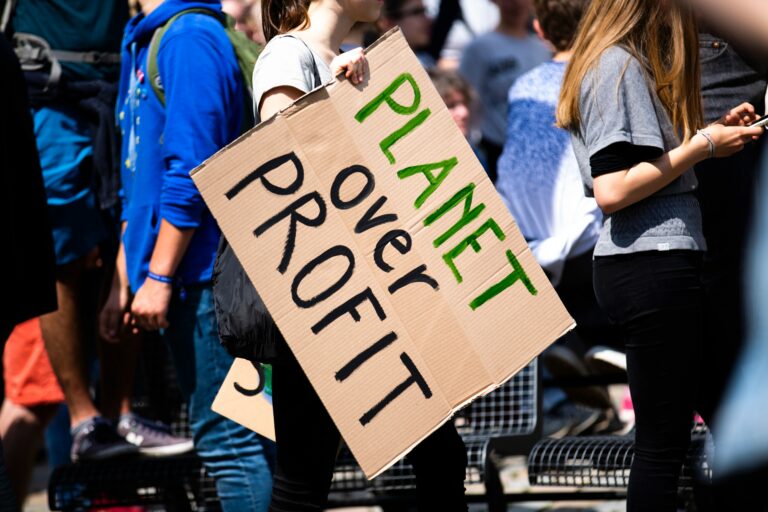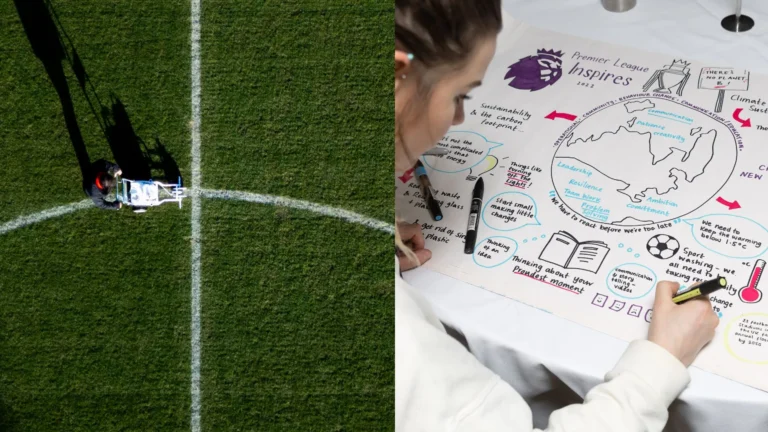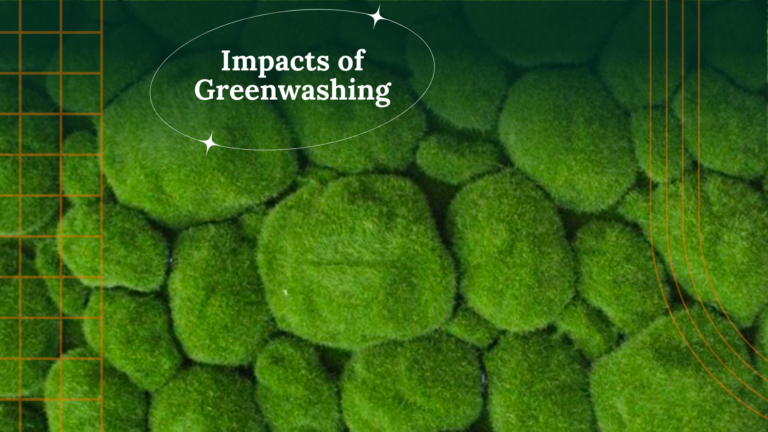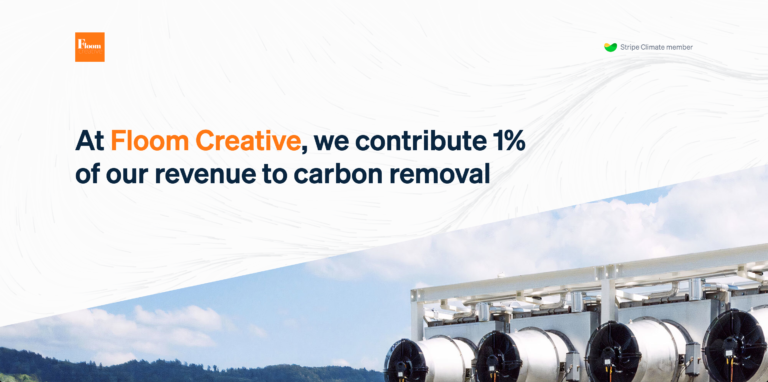Following on from our previous blog on sustainability in football (read here), it begs the question: How well are football clubs and leagues really performing when it comes to sustainability?
https://diamondfootball.com/news/4115/football-pitch-sizes-explained
From headline strategies at the Premier League to grassroots efforts at individual clubs, the game’s response to sustainability pressure is taking shape in different ways, some inspiring, while others are still falling short. With football’s global reach and influence, what these organisations choose to prioritise can have ripple effects far beyond the pitch.
Let’s explore what’s being done, what still needs work, and where football’s future could be headed.
Premier League: (Full blog on sustainability in the Premier League can be found here.)
As the most-watched football league in the world, reaching over 920 million households across 189 countries, the Premier League holds incredible power when it comes to shaping conversations and behaviours far beyond the pitch. With such vast reach comes significant responsibility.
In March 2025, the league finally unveiled its long-awaited sustainability strategy, marking its first direct steps toward environmental leadership. The plan focuses on three key priority areas:
Bundesliga:
- Since the 2023/24 season the Bundesliga have introduced mandatory sustainability licensing. This means that each club, as part of their professional license, must meet a certain level of environmental criteria, such as carbon accounting, energy efficiency, sustainable water use, and waste management.
- The DFL has implemented a league-wide data system to collect and analyse sustainability metrics from the top two German leagues clubs, covering emissions, energy, water usage, and waste. Unlike many leagues where reporting is fragmented or voluntary, this initiative creates a centralised baseline for the entire league system.
The DFL uses this data to benchmark progress across clubs, identify best practices, and inform future regulations. This approach reflects a shift from passive encouragement to active environmental governance.
CONMEBOL:
- At Copa América 2019 in Brazil, CONMEBOL worked with local waste cooperatives to sort and process recyclables at stadiums, and deployed spill-response “mitigation kits” for onsite generators.
- Across five host cities, over 300 young participants (aged 15–18) took part in sustainability workshops on-site at Copa América matches, helping to link environmental stewardship and football culture.
- Through its 2022/23 Communication on Engagement, CONMEBOL pledged alignment with the UN Global Compact’s sustainability principles, reporting on governance, labour, environment, and anti-corruption, however specific tournament or league-wide climate targets remain undeclared.
https://lbbonline.com/news/futlove-and-conmebol-unveil-a-new-way-of-celebrating
Major League Soccer (MLS):
- Since 2018 the MLS has led a league-wide Earth Week initiative, planting over 27,000 trees across North America in partnership with One Tree Planted, and offsetting more than 28,000 tonnes of CO₂ via carbon credit investments from South Pole.
- This year MLS clubs have diverted 132 t of surplus food into local donations, cutting waste and tackling food insecurity in one move.
Club Initiatives:
- Tottenham Hotspur Football Club– In addition to committing to become net zero by 2040, Tottenham have been encouraging biodiversity throughout their training complex, through bat roosts, bug hotels, and meadows. Watch below Eric Dier talk on the work they have been doing at Hotspur Way:
Eric Dier’s Training Ground tour! 🌿 Vegetable garden, The Lodge & bug hotels!
- Liverpool FC– Developed the worlds-first carbon neutral jersey, using advanced carbon capture technology.
- Manchester City FC– To power their training facilities and Joie Stadium, Man City have installed almost 11,000 solar panels.
- VFL Wolfsberg– A true success story in football, as of 2020 Wolfsberg operates off of 100% renewable energy in addition to zero landfill waste. This achievement has marked them as the Bundesliga’s most sustainable club.
https://www.vfl-wolfsburg.de/en/vfl/corporate-responsibility
- TSG Hoffenheim– Their home ground, the PreZero Stadium, is the Bundesliga’s first zero-waste stadium.
- FC Barcelona– Promoting sustainability with plant-based food, solar power, and an organically maintained pitch. FC Barcelona are also aiming to achieve net zero and zero waste by 2030.
- Real Betis– launched Forever Green, a multi-stakeholder platform with UN and government backing focused on carbon neutrality, recycling, LED upgrades, and eco‑mobility.
- Forest Green Rovers FC– Known for being the world’s first carbon-neutral club, Forest may not be able to compete with the big teams currently but they are showing that they can still lead the table in sustainability. They are even going as far to build their stadium from wood (concept below) and promote biodiversity through reforestation efforts.
https://www.fgr.co.uk/eco-park
Through these examples it is clear that clubs are starting to take initiatives and use their immense influence and financial reach to promote sustainability initiatives and strive for a cleaner world.
International Competitions:
FIFA World Cup:
Since the 2010 South Africa tournament, FIFA has ‘prioritised’ sustainability via its UN Sports for Climate Action membership. At COP26 in 2021, they launched a formal FIFA Climate Strategy, committing to reduce emissions by 50% by 2030 and reach net-zero by 2040, along with strengthening climate education, adapting tournament regulations, and supporting grassroots climate solutions.
https://www.forbes.com/sites/tomsanderson/2023/06/13/lionel-messi-confirms-retirement-from-world-cup
However, this has been met with some backlash. Fifa has claimed the 2022 Qatar World Cup to be carbon neutral within their control, however, Carbon Market Watch claims that their investigation “casts significant doubt on this claim”. In addition, the 2026 competition has been expanded to 48 teams across three nations, almost certainly increasing the amount of travel between games for both fans and their teams.
Fifa has also been strongly criticized for holding events in countries, like Qatar, accused of violating human rights, with claims of worker mistreatment and exploitation, including wage theft and thousands of unexplained worker deaths.
UEFA Euros:
EURO 2024, hosted across ten stadiums in Germany, represented a significant shift in sustainable tournament planning. UEFA powered all venues with 100% renewable energy, reduced team flights by 75% through regional match groupings, and contributed €7 million to a grassroots climate fund.
Fan transport was a key focus. Ticketing was integrated with local public transit to reduce emissions, and travel guidance encouraged lower-impact options over flights and private vehicles. UEFA also introduced carbon tracking systems to monitor the tournament’s environmental impact and pledged to publish a comprehensive post-event sustainability report.
While these efforts marked meaningful progress, the long-term impact depends on transparency in reporting and how effectively learnings are applied to future competitions. As one of the world’s most visible sporting events, the Euros have the power to shape best practices in sustainability, or expose gaps in ambition and accountability. With the dust now settled on EURO 2024, the spotlight turns to UEFA’s follow-through.
Africa Cup of Nations:
The 2025 hosts (Morrocco) have initiated infrastructure upgrades for the competition, including energy and water efficiency upgrades at key stadiums, unfortunately comprehensive environmental impact data still hasn’t been publicly released as of yet.
FIFA Club World Cup:
The expanded 2025 Club World Cup, held across the U.S., has drawn heavy criticism over its environmental and player welfare implications. With matches scheduled thousands of miles apart, emissions from travel are expected to spike, directly contradicting FIFA’s own climate pledges.
The added fixtures, coming at the end of an already packed season, have sparked concern from FIFPRO, calling it “unsustainable” for both the planet and players.
FIFA’s poor track record on transparency and offset claims continues to draw accusations of greenwashing.
Football is no longer just flirting with the idea of sustainability, it’s taking tangible, if uneven, steps toward environmental responsibility.
From the Premier League’s long-overdue strategy to Bundesliga’s robust licensing standards, and from grassroots club innovation to the evolving ambitions of international tournaments, the sport’s global ecosystem is starting to recognise its impact. Football, with its cultural reach and emotional resonance, has the unique power to galvanise climate action not just within the industry, but among billions of fans worldwide.
https://www.cleanenergywire.org/news/euro-2024-most-sustainable-football-championship-all-time
The future of the sport depends not just on how well teams perform on the pitch but how boldly the game confronts its impact off it. Sustainability is no longer a sideline issue. It’s a central one. The next decade will determine whether football can truly lead, or whether it gets left behind by a world that demands better.
Written by Tom Eden-Rea. 24/06/2025
References:
https://www.premierleague.com/news/4266971
https://www.epa.gov/energy/greenhouse-gas-equivalencies-calculator
https://www.dw.com/en/bundesliga-playing-a-pioneering-role-in-sustainability/a-63210461?
Floom Creative | B Corp Certified
We specialise in creating narratives for brands, nonprofits and charities that have their values rooted in environmental and ethical consciousness. By communicating your vision through visual storytelling and performance marketing, we can help your brand to flourish.
Let’s talk! We’d love to help you with your sustainable storytelling. Contact us now.
Check out our blog HERE
Check out our work HERE.
Check out our services HERE.
Follow us on socials:
























